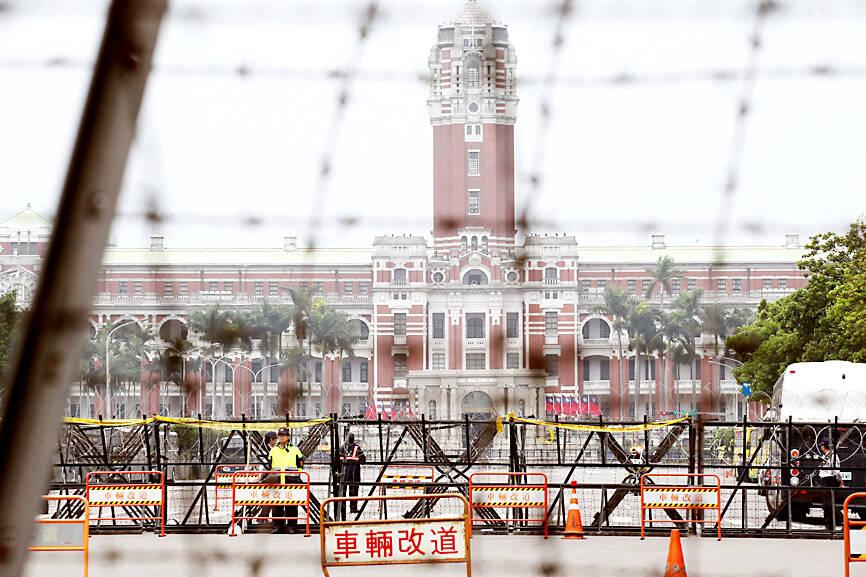Four former military personnel, including three who were responsible for security at the Presidential Office Building, were sentenced to prison terms of up to seven years today on charges of selling state secrets to China.
Three of the men, Sergeant Lai Chung-yu (賴重宇), Sergeant Lee Yu-hsi (黎育璽) and Corporal Lin Yu-kai (林裕凱), served in the 211th Military Police Battalion, while a fourth, Chen Wen-hao (陳文豪), served in the Ministry of National Defense’s Information, Communications and Electronic Force Command.
The Taipei District Court sentenced Lai to seven years, Lee to six years and eight months and Chen to six years and five months in prison, with all of them deprived of their civil rights for six years.

Photo: CNA
Lin was sentenced to five years and 10 months and deprived of his civil rights for five years.
The court also confiscated NT$664,100 from Lee, NT$460,000 from Lai, NT$450,000 from Chen and NT$265,900 from Lin.
Lai, Lee and Chen were already discharged from the military when prosecutors launched their investigation, while Lin was suspended in August last year when he was detained.
From the end of 2021 to the beginning of 2022, Lai and Chen were allegedly brought into the scheme by a man surnamed Huang (黃), who is currently wanted, on behalf of China’s intelligence agents, Taipei prosecutors said.
Starting in April 2022, Chen used his cellphone to take photographs of classified documents before passing them on to Lai and Chen, or Chinese agents, prosecutors said.
From March 2023 to August last year, Chen, operating under an alias, started to seek out fellow soldiers who would be willing to spy on behalf of China for rewards, prosecutors said.
He forwarded the information of one active-duty soldier to Lai, although the soldier did not agree to join the scheme, prosecutors said.
Lai and Chen were compensated by the level of sensitivity of information provided to the agents, and how many fellow soldiers they contacted as part of the scheme, prosecutors said.
In October 2022, Lai was transferred to a new unit, and he referred Lee to his old unit, who continued the scheme by using his cellphone to take photographs of official documents and pass them on to agents, prosecutors said.
After Lee was discharged from the military, he introduced Lin to the unit, who continued the espionage activities from January last year onward, prosecutors said.
The Taipei District Prosecutors’ Office concluded its investigation in December last year, charging the four with accepting bribes in contravention of the Anti-Corruption Act (貪污治罪條例) and the National Security Act (國家安全法) in exchange for collecting state secrets on behalf of China.
After being questioned and detained, all four men confessed, prosecutors said.

Taiwan is stepping up plans to create self-sufficient supply chains for combat drones and increase foreign orders from the US to counter China’s numerical superiority, a defense official said on Saturday. Commenting on condition of anonymity, the official said the nation’s armed forces are in agreement with US Admiral Samuel Paparo’s assessment that Taiwan’s military must be prepared to turn the nation’s waters into a “hellscape” for the Chinese People’s Liberation Army (PLA). Paparo, the commander of the US Indo-Pacific Command, reiterated the concept during a Congressional hearing in Washington on Wednesday. He first coined the term in a security conference last

Prosecutors today declined to say who was questioned regarding alleged forgery on petitions to recall Democratic Progressive Party (DPP) legislators, after Chinese-language media earlier reported that members of the Chinese Nationalist Party (KMT) Youth League were brought in for questioning. The Ministry of Justice Investigation Bureau confirmed that two people had been questioned, but did not disclose any further information about the ongoing investigation. KMT Youth League members Lee Hsiao-liang (李孝亮) and Liu Szu-yin (劉思吟) — who are leading the effort to recall DPP caucus chief executive Rosalia Wu (吳思瑤) and Legislator Wu Pei-yi (吳沛憶) — both posted on Facebook saying: “I

The Ministry of Economic Affairs has fined Taobao NT$1.2 million (US$36,912) for advertisements that exceed its approved business scope, requiring the Chinese e-commerce platform to make corrections in the first half of this year or its license may be revoked. Lawmakers have called for stricter enforcement of Chinese e-commerce platforms and measures to prevent China from laundering its goods through Taiwan in response to US President Donald Trump’s heavy tariffs on China. The Legislative Yuan’s Finance Committee met today to discuss policies to prevent China from dumping goods in Taiwan, inviting government agencies to report. Democratic Progressive Party Legislator Kuo Kuo-wen (郭國文) said

Sung Chien-liang (宋建樑), who led efforts to recall Democratic Progressive Party (DPP) Legislator Lee Kun-cheng (李坤城), was released on bail of NT$80,000 today amid outcry over his decision to wear a Nazi armband to questioning the night before. Sung arrived at the New Taipei District Prosecutors’ Office for questioning in a recall petition forgery case last night wearing a red armband bearing a swastika, carrying a copy of Adolf Hitler’s Mein Kampf and giving a Nazi salute. Sung left the building at 1:15am without the armband and covering the book with his coat. Lee said today that this is a serious